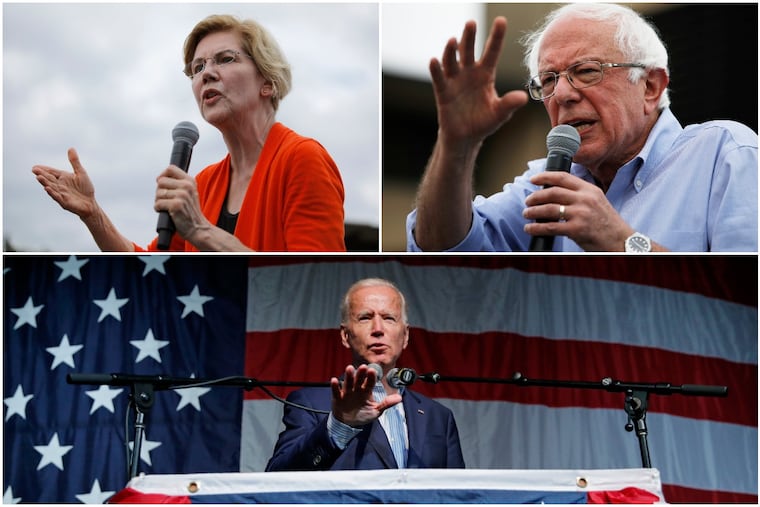Monmouth University Poll shows Joe Biden, Bernie Sanders, Elizabeth Warren in dead heat
Pollster Patrick Murray said he thinks the poll shows that Democrats are entering a period of volatility when it comes to who they like.

UPDATE: Monmouth University pollster Patrick Murray said Aug. 28, two days after the poll’s release that its poll is an outlier given subsequent national polls showing former vice president Joe Biden up by at least 10 points. “It occurs very infrequently, but every pollster who has been in this business a while recognizes that outliers happen," Murray said. "This is the sixth time this year Monmouth has conducted a national poll of the 2020 Democratic field. We used the same methods in each case.”
A Monmouth University poll released Monday showed former Vice President Joe Biden tied with Massachusetts Sen. Elizabeth Warren and Vermont Sen. Bernie Sanders in the Democratic race for president — a substantial shift from a month ago that signals the race could be becoming more volatile.
Warren had support from 20% of respondents, as did Sanders, while Biden drew 19%.
“I think what we’re seeing is that we’re entering an uncertain phase here, as voters are starting to tune in, and depending on the day you catch them, you’re going to catch different results," pollster Patrick Murray said. "It’s unsettled. And we could go out and poll next week and get, I think, different numbers, just simply because it’s churning.”
The poll is an outlier — several recent national polls show Biden with between a 3- and a 15-point lead. Most have him ahead of Warren by about 10 points.
Monmouth’s poll is based on telephone interviews of 800 adults nationally — 298 of the respondents identified themselves as Democrats or leaning toward the party. Results are subject to a margin of error of plus or minus 6 percentage points.
Its finding of an ascendant Warren and a slowing Biden sparked criticism on social media from some pollsters and data types, who were skeptical the race could have changed so dramatically. It’s possible that Monmouth picked up the early signs of a shift; at any rate, pollsters caution it’s best to view each survey in context with data available from other polls.
Still, the poll shows the most movement nationally in the race, with Biden’s support among all constituents dropping and his closest challengers picking up those supporters.
Biden loses support in every category
Biden dropped 12 points overall since the last time Monmouth polled in June. He lost support with white Democrats, voters of color, people with no college degree, and college graduates, men and women.
“We’ve known Biden support was not strong support," Murray said. "There wasn’t a strong attachment to him, and this could be an indication of that, that the electorate is open to movement — or it’s possible he could bounce right back.”
Biden, in the poll, is also losing support in both early and late-voting primary states. In the states that vote first in the primaries, Biden dropped six points and Warren made notable gains from 9% percent in May to 20% percent in August. In states that hold primaries or caucuses after Super Tuesday (March 3, 2020), Biden’s support dropped even more, from 38% percent in June to 17% percent in August.
The poll was conducted a few weeks after Biden made headlines for a series of small gaffes, including misstating where two mass shootings occurred and accidentally botching his words saying “poor kids are just as bright … as white kids.” It fell about a month after the most recent debate, in which Biden absorbed attacks from several other candidates on the stage.
Biden’s campaign was quick to call the Monmouth poll a fluke, noting that a Morning Consult poll from last week with a larger sample size had Biden leading by 30 points. The campaign also pointed to polls that show Biden does best against Trump in head-to-head matchups.
“Poll after poll also confirms that, because of the high stakes of this election, Democratic primary voters are the most energized about a nominee who can take on and defeat Donald Trump," campaign spokesperson Andrew Bates said, adding that Biden is best suited to do that.
Warren and Sanders keep gaining
Warren and Sanders are picking up former Biden supporters, the poll indicates.
Warren has also benefited from an increasing favorability rating — 52% of those polled had a favorable opinion of her, the most of any candidate, followed by Biden at 41%.
While Warren and Sanders have gained, the rest of the field has remained largely static, suggesting, Murray said, that more moderate voters may be expressing doubts about Biden and swinging toward the best-known left-leaning candidates.
“Warren support has been climbing consistently since March,” Murray said. “Others have risen or fallen back, and that’s not the case with Warren, which is why she looks a little more solid.”
Voters are confused about what ‘Medicare for All’ actually means
Health care dominated a large chunk of the debates in July, and “Medicare for All” has become a rallying call for many. What a given candidate might mean by that phrase, though, is confusing to voters. Sanders and Warren favor a public system that would replace private insurance. Each cites polls showing support for such a plan. California Sen. Kamala Harris and Biden have plans that allow some private insurance.
The August Monmouth poll found Democrats know they want to expand health care coverage but disagree on what Medicare for All means. Fifty-eight percent of party voters said it’s important that the Democrats nominate someone who supports Medicare for All. When asked specifically what type of health insurance system they prefer, though, 53% of Democrats said they want a system that allows private insurance to remain an option.
"And that’s a warning sign to Democratic candidates that you better be careful if you’re following polls that say there’s majority support for Medicare for All,” Murray said.